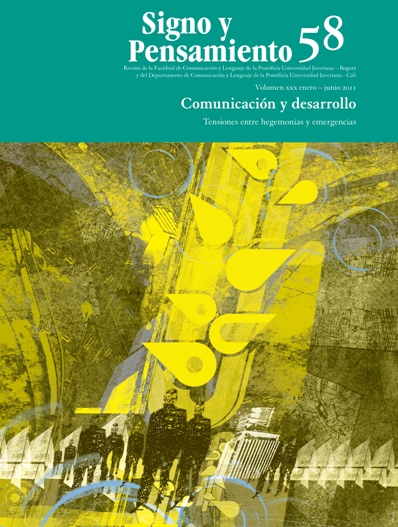Abstract
This article deals with the socio-cultural construction with which, starting with the metaphor “a cluster is war,” the Textile/Garment, Design, and Fashion Cluster in Antioquia was worked out. Herein we show how the Cluster resulted from the way in which production was organized and then attempt to describe the methodology behind the process of interpreting metaphoric experiences. We portray the metaphors from which the aforementioned cluster was drawn: “market is war,” “to struggle for market share is fear,” “the fight is here and there,” “competition is huge, friendly, and important,” as well as the strategies and tactics used by the Cluster’s builders both to protect and fight for the market. This text makes part of the results of the doctoral research work done by the author on this particular Cluster.
Bauman, Z. (2006), Miedo líquido: la sociedad contemporánea y sus temores, Buenos Aires, Paidós Ibérica.
Benavides C., J. (1997), “Comunicación, cultura y política. Desarrollo y globalización ¿un horizonte sin ilusiones?”, en ix Encuentro Latinoamericano de Facultades de Comunicación Social (Felafacs), Lima, Universidad de Lima.
Black, M. (1954), Metáfora, procedimientos de la sociedad aristotélica. La filosofía del retórico, Oxford, Prensa de la Universidad de Oxford.
Bustos, E. (2000), La metáfora, ensayos transdisciplinares, Madrid, Universidad Nacional de Educación a Distancia, Fondo de Cultura Económica.
Cámara de Comercio (2005), Balance tecnológico, cadena productiva, Bogotá, Cámara de Comercio de Bogotá.
Castells, M. (2004), The Power of Identity, Malden, MA, Blackwell.
— (2004), “La era de la información”, La sociedad red, vol. 1, Madrid, Alianza Editorial.
Fuentes, N. R. (2010), Doctorado en Estudios Científicos Sociales, Guadalajara, iteso, Universidad Jesuita de Guadalajara.
Hesse, M. (1966), Models and Analogies in Science, Notre Dame, University of Notre Dame Press.
Isus, S.; Cela, J., y Farrús, N. (2002), “Desarrollo de competencias de acción profesional a través de las tecnologías de la información y la comunicación: una visión crítica”, en Actas del ii Congreso Europeo en Tecnologías de la Información y la Comunicación y la Ciudadanía, Barcelona, Universidad de Barcelona.
Lakoff, G. y Johnson, M. (1998), Metáforas de la vida cotidiana, Madrid, Cátedra.
Lizcano, E. (1998), “La metáfora como analizador social”, Revista Empiria, núm. 2, pp. 29-60.
Martín-Barbero, J. (1995), “Pretextos”, Conversaciones sobre la comunicación y sus contextos, Cali, Colección Ensayo Iberoamericano, Universidad del Valle.
Porter, M. (1998, noviembre-diciembre), “Clusters and the new economics of competition”, Harvard Business Review, vol. 6, núm. 76, pp. 77-90.
Real Academia Española (rae) (2007), Diccionario, Real Academia Española (rae) [en línea], disponible en http://buscon.rae.es/diccionario/ drae.htm, recuperado: 10 de julio de 2007.
Reguillo, R. (2006), “Los miedos: sus laberintos, sus monstruos, sus conjuros. Una lectura antropológica”, Etnografías contemporáneas, vol. 2, núm. 2, pp. 45-74.
Rivano, E. (1997), Metáfora y lingüística cognitiva, Santiago de Chile, Bravo y Allende Editores.
Valle Flórez, M. (2009, julio-diciembre), “Categorías de análisis de los estudios sobre cluster en las corrientes de la economía industrial y de la aglomeración”, Revista Politécnica, núm. 9, pp. 72-86.
Witker, I. (2006), China/América Latina: la relación con una potencia anti status quo. Academia Nacional de Estudios Políticos y Estratégicos de Chile [en línea], disponible en http://www. anepe.cl3 oro/Articulos/columna Witker04. htm, recuperado: 4 de julio de 2007.
This journal is registered under a Creative Commons Attribution 4.0 International Public License. Thus, this work may be reproduced, distributed, and publicly shared in digital format, as long as the names of the authors and Pontificia Universidad Javeriana are acknowledged. Others are allowed to quote, adapt, transform, auto-archive, republish, and create based on this material, for any purpose (even commercial ones), provided the authorship is duly acknowledged, a link to the original work is provided, and it is specified if changes have been made. Pontificia Universidad Javeriana does not hold the rights of published works and the authors are solely responsible for the contents of their works; they keep the moral, intellectual, privacy, and publicity rights.
Approving the intervention of the work (review, copy-editing, translation, layout) and the following outreach, are granted through an use license and not through an assignment of rights. This means the journal and Pontificia Universidad Javeriana cannot be held responsible for any ethical malpractice by the authors. As a consequence of the protection granted by the use license, the journal is not required to publish recantations or modify information already published, unless the errata stems from the editorial management process. Publishing contents in this journal does not generate royalties for contributors.


